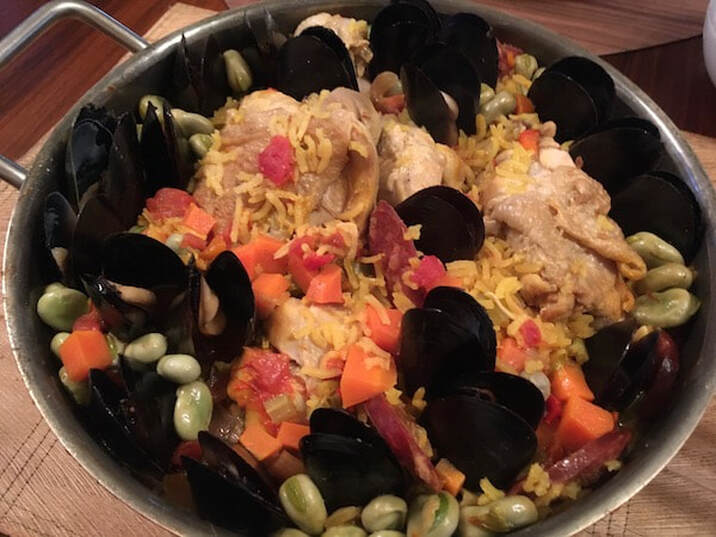|
Is this a Paella or just my deconstructed dish of chicken, mussels and saffron rice? How important is tradition when it comes to a national dish? (Spain of course in this instance). Should it constrain us or free us to improvise?
They say Paella was once a meal eaten outdoors, made in a flat pan over a fire pulled together from foraged sticks. It was a meal eaten by workers in the fields from what could be caught and added to with rice and herbs, (often rabbit and snails). Somehow it evolved into a dish of many elements, but held together by rice, garlic and saffron. I've been told by a friend just back from Madrid that as the dish is originally from Valencia, everywhere else, you just call it rice - arroz con pollo y langostinos, for example. Only in Valencia is it Paella. In Cordoba, you order rice with... Now that's taking local appellation very seriously. Close relatives of the Paella, or rice cooked with other "stuff" (as a one pot dish) are everywhere.
The best polo I know is Shireen Polo - rice, chicken, slivered pistachio and almonds, orange rind, carrots, saffron, the whole sweetened with a dangerous amount of sugar which makes the golden colours glisten. It's definitely made for an occasion. Is a Jumbalaya just a saffron-free Paella? Is Biryani just a young sibling of the Pilau? (Didn't some Persians drop down into India some centuries ago?) Is Paella just Shireen Polo without the nuts? There is certainly different rice used in each dish, perhaps different spicing but ultimately, I guess, it's down to provenance, locality, country, "terroir". So in Australia, what do we call it? And is there ever a life situation, gastronomic or other, that can't be illustrated by a Seinfeld episode? Compare dumpy George with the sexy, exuberant Kramer. George Costanza: Paella? It’s a mélange of meat and fish with rice. Very tasty. Kramer: Have you ever had really good paella? Oh, it's an orgiastic feast for the senses. A festival of sights, sounds and colours. So I have a nice robust chicken, some locally sourced mussels, tiny broad beans picked that morning by my brother Jean-Pierre, (grown by his wife Liz), and enough saffron left with which to be generous before my next "gift box" arrives. As usual, I'm with Kramer, the hipster doofus. (Seinfeld, season 5, eps 18 & 19) And it's a very difficult dish to make in small quantities! Georges mother Estelle Costanza: What am I gonna do with all this Paella? (And this very week, in the Spectator, I read about Paella. paella-five-top-tips Zeitgeist! We concur and I further learn you eat it with a spoon, which I feel very comfortable with. Yes, yes, the Spectator is a monstrously conservative mag. It can, unfortunately, be very amusing. Trust me, I balance it with The New Yorker, The Guardian, The New York Times et al and my natural bolshy tendencies,) So tradition or improvisation? A close friend and I should/could host a cooking show. No, not The Two Fat Ladies but the Traditionalist and the Iconoclast. Join the conversation. Comment👇. Are you a traditionalist or an iconoclast?
6 Comments
14/11/2019 11:42:23 am
O noble symphony of colours!
Reply
Barbara
14/11/2019 03:44:36 pm
Putting on my historian's hat ... I believe the name comes from the pan (you know it as poêle), and its origins lie in medieval Catalan cuisine, Valencia of course being Catalan. What I find fascinating is that along the Catalan coast pasta (broken fine pasta, fideus) is cooked in exactly the same way, in the same sort of pan, with the same sort of additions.
Reply
Yes I should have mentioned the pan it's cook in. I do my rice with chicken etc. in a copper "sauteuse" so I never get the "socarrat", the lovely bottom crust. What I was trying to show here was how universal are our cooking traditions.
Reply
Marina H-C
18/11/2019 11:08:12 am
If one is interested in history, always a good place to begin with any research is the History of the Food. It tells so much.
Reply
Food for everyday has changed so much - once simple dishes have become "special" and we love it. But I'm beginning to question the romance of " la cucina povera" and will do some questioning and reading. The myth of Marco Polo and pasta coming to Italy from Asia however, was debunked years ago.
Reply
Leave a Reply. |
Categories
All
|

 RSS Feed
RSS Feed
